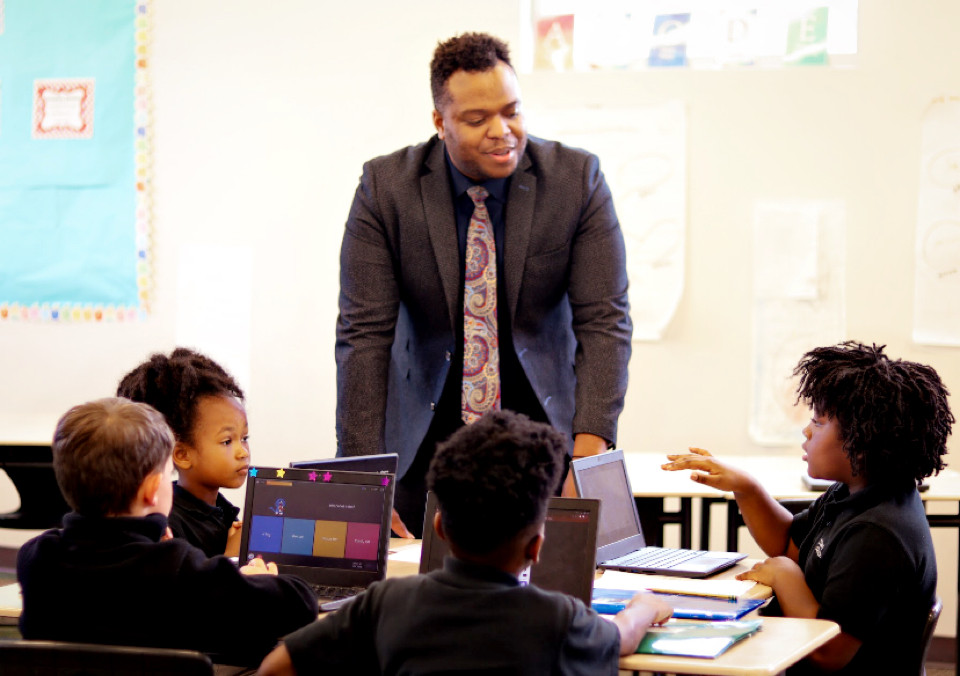Game-based learning has always thrived on the idea that education can be fun, immersive, and uniquely tailored to each learner. Today, artificial intelligence (AI) is turning that idea into reality by driving unprecedented levels of personalization in educational games. This month, we’re exploring how emerging technologies like AI are shaping the future of game-based learning, with a special focus on multiplayer educational games.
From classrooms powered by AI-enabled textbooks to online tutoring platforms that adapt to every student’s needs, AI is redefining how, when, and where we learn. Let’s dive into some standout examples of AI-driven personalized education and how they’re paving the way for a more equitable, engaging, and learner-centered future.
Demonstration of an AI-enabled elementary classroom in Korea, showcasing AI digital textbooks and interactive learning tools. Copyright: Ministry of Education, Republic of Korea; Image Credit: World Bank Blogs
The Republic of Korea is set to become the first country to roll out AI digital textbooks nationwide, beginning in 2025. These advanced tools adapt content based on student performance, offering real-time feedback and customized lessons in core subjects like math, English, and science.
In this AI-powered classroom, teachers take on a more dynamic role, shifting from traditional instruction to mentoring and facilitating project-based learning. This approach not only enhances individual learning experiences but also equips students with critical 21st-century skills like collaboration and problem-solving. Korea’s commitment to iterative development and teacher training ensures that its AI integration serves as a model for the world.

Dr. Jeffrey Foster with students. Image via Jeffrey Foster.
For educators like Dr. Jeffrey Foster, AI represents an exciting evolution in personalized learning. Tools powered by AI can reduce the time spent on routine tasks like grading and lesson planning, freeing teachers to focus on guiding students through more meaningful, individualized learning experiences.
From adaptive playlists to real-time progress tracking, AI is empowering students to take greater control over their education. As Dr. Foster points out, this shift allows educators to become facilitators of personalized learning journeys rather than merely content providers, ensuring that every student’s unique needs are met.
Image credit: Shutterstock / New America
AI isn’t just about personalization—it’s also enhancing collaboration in multiplayer educational games. Platforms like NextGEN Academy demonstrate how gaming environments can use AI to foster teamwork and communication skills. By blending esports with AI-driven tutoring, NextGEN creates a learning space where students work together on creative challenges while mastering academic subjects.
Similarly, Korean classrooms are incorporating AI to support group-based projects, with real-time feedback tools that help teams solve problems more effectively. These applications highlight how AI can enhance the social aspects of learning, making it more engaging and inclusive.
Challenges and Opportunities in AI Education
While the promise of AI in education is immense, it also brings challenges. Issues like equitable access, potential biases, and the need for transparency in AI algorithms are critical considerations. For instance, research has shown that AI can inadvertently reinforce educational disparities if not carefully implemented. Addressing these challenges requires regular audits of AI tools, as well as policies to ensure that all schools have access to high-quality digital resources.
At the same time, the opportunities are transformative. AI’s ability to analyze data and provide personalized insights is helping students achieve more while giving teachers powerful tools to enhance their instruction. As platforms like ClassUp and Korea’s AI digital textbooks demonstrate, the future of education is one where every learner has the support they need to succeed.
At Filament Games, we’re excited about the potential of AI to transform game-based learning. Whether it’s developing AI-driven educational games or collaborating with partners to design cutting-edge learning solutions, we’re committed to creating experiences that inspire and empower every learner.
Got an AI-powered project in mind? Contact us today to learn how we can bring your educational vision to life!